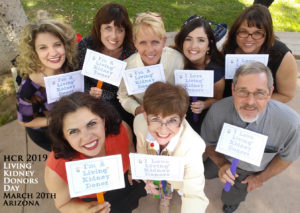 Living Donor Protection Act (H.R. 2923 / S. 1384)
Living Donor Protection Act (H.R. 2923 / S. 1384)
After Five Attempts to Pass, Let’s Make This Year Our Last!
When life gives you a 2nd chance, you want to make it count. I’ve been chipping away at this goal ever since I received my preemptive kidney transplant from an unrelated living kidney donor 13 years ago. Yet, as I advocate to increase preemptive transplant opportunities and create patient engagement programs for transplant centers, allied partners, and various organizations—all my efforts seem to pale in comparison to the truth that remains.
More than 178,000 (and counting) living kidney donors are inadequately protected.
Living kidney donors are brave and selfless souls who offer great promise for a better and longer life. The life I now live. But what assurances do they get for being our life-saving heroes? Many of us believe living donors deserve far more guarantees. Allow me to point out the inequities below:
Inequity #1: Living kidney donors put their life at risk to save the life of another without personal or financial benefit, or future protections.
Inequity #2: Living donors risk insurance discrimination by potentially being denied coverage for life, disability, and long-term care insurance. They can also have their coverage limited (or charged at a higher rate) just because they’re a living donor.
According to a study published in the American Journal of Transplantation 25% of living donors had trouble getting life insurance. They were denied, charged more, or told they had a “pre-existing” condition. *If there is any “pre-existing” condition to be considered, it should be their rigorously tested (and proven) health record that qualified them for donation.
Inequity #3: Living donors lack job security. They need assurances that their job will still be there when they return from taking time off for donation or recovery.
The Solution: The Living Donor Protection Act (LDPA)—currently known as H.R. 2923/S. 1384 (2023-2024), was designed to course-correct these barriers to donation by educating donors about these protections against insurance discrimination and job loss.
To that end, the passing of this bill would honor and protect living donors from both current and future discrimination when applying for life, disability, and long-term care insurance. By doing so, they cannot be denied, cancelled, or refused issue—and their premiums cannot increase solely based on the fact that they’ve donated an organ.
Additionally, this bill calls upon the U.S. Department of Labor to codify organ donation and recovery as a covered classification under the Family and Medical Leave Act of 1993 (FMLA). It also calls on the Secretary of Health and Human Services to educate the public on the benefits and risks of living organ donation.
The Urgent Call: Countless lives are lost each year this bill doesn’t pass. Annually, this equates to more than 8,600* waitlisted kidney patients losing their chance for ever getting a kidney transplant, because they either became too ill or died while waiting for a deceased donor’s kidney. *
*Looking back to the first year we tried (and congress failed) to pass protections for living organ donors (2013-2014), the number of casualties has increased 10-fold. If we only count the years we have been advocating for change, our nation’s organ shortage has impacted nearly 90,000 kidney patient lives—and it’s on course to only get worse. That is, until we educate the public on living donation and remove critical barriers.
Increasing & Protecting Living Donors
Living kidney donation is the preferred alternative to the long wait for a deceased donor’s kidney. Getting a kidney from a living donor not only shortens the wait—kidneys from living donors do better and last longer.
Undoubtedly, more people would consider live donation if there was more public awareness and education about the procedure, recovery and risks—and specific protections were offered (and better known) before donation. The passing of LDPA 2023-2024 would make this so.
Granted, this bill may not include everything living donors deserve, like life insurance against the risk of death or long-term disability for health effects as a result of donating an organ, or medical expense reimbursement for long-term follow up care. Nonetheless, it’s an incredibly important step forward.
You would think with bipartisan support throughout the years (i.e., 2014, 2016, 2017, 2019 and 2021), and support from transplant professionals, nephrologists, kidney patients, transplant recipients, living organ donors, and even the insurance industry, it would have passed into law by now.
This Is Our Sixth Attempt. Let’s Make It Our Last.
We need your voice to encourage legislators of the 118th Congress to support H.R. 2923/S.1384 (2023-2024), and get it across the finish line and signed into law—once and for all.
It’s not just the right thing to do. It’s a moral duty way past its time.
Take Action Now!
Step 1: Use this link to send a letter to your U.S. Representatives
https://voices.kidney.org/ldpa/
Step 2: Sign AAKP’s Petition (look for the header “TAKE A STAND” at link below)
http://www.votervoice.net/Shares/BAAAAA7xAE18AAwQoHc7FBA
Sponsors of this bill: The Living Donor Protection Act (H.R. 2923 / S. 1384) – 2023-2024 is sponsored by Senators Kirsten Gillibrand (D-NY) and Tom Cotton (R-AR), and Representatives Jerrold Nadler (D-NY), Troy Balderson (R-OH), Jim Costa (D-CA), John Curtis (R-UT), Diana DeGette (D-CO), Mariannette Miller-Meeks (R-IA), Gregory F. Murphy, M.D. (R-NC) and Lisa Blunt Rochester (D-DE)
Article written by: Risa Simon, Founder of TransplantStrong.com (A division of Simon Says Seminars, inc.)
For more information email: Risa@transplantstrong.com







 HHS reports a 73 Million Dollar Savings Over 10 Years, by extending immunosuppressive medication coverage for kidney transplant patients under Medicare
HHS reports a 73 Million Dollar Savings Over 10 Years, by extending immunosuppressive medication coverage for kidney transplant patients under Medicare

